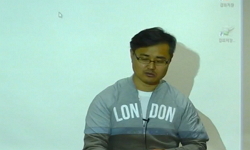In the 18th century, the 'Club des Jacobins' in France ruthlessly used violence against the royalists in the course of their rule, causing fear among citizens. It was named "Terrorism Politics" and the concept of terrorism originated from this Jacobin...
http://chineseinput.net/에서 pinyin(병음)방식으로 중국어를 변환할 수 있습니다.
변환된 중국어를 복사하여 사용하시면 됩니다.
- 中文 을 입력하시려면 zhongwen을 입력하시고 space를누르시면됩니다.
- 北京 을 입력하시려면 beijing을 입력하시고 space를 누르시면 됩니다.
국제테러리즘의 일반적 규제 필요성에 관한 연구: 국제형사재판소규정을 중심으로 = A Study on The Necessity for General Regulation of International Terrorism: Rome Statute of the International Criminal Court
한글로보기https://www.riss.kr/link?id=T16375002
- 저자
-
발행사항
서울 : 동국대학교 일반대학원, 2022
-
학위논문사항
학위논문(석사) -- 동국대학교 일반대학원 , 법학과 국제법 전공 , 2022. 8
-
발행연도
2022
-
작성언어
한국어
- 주제어
-
발행국(도시)
서울
-
형태사항
iii, 99 p. ; 26 cm
-
일반주기명
지도교수: 오미영
-
UCI식별코드
I804:11020-000000085119
- DOI식별코드
- 소장기관
-
0
상세조회 -
0
다운로드
부가정보
다국어 초록 (Multilingual Abstract)
In the 18th century, the 'Club des Jacobins' in France ruthlessly used violence against the royalists in the course of their rule, causing fear among citizens. It was named "Terrorism Politics" and the concept of terrorism originated from this Jacobins way of governing. Terrorism, which had limited victims to those with different political interests, began to show an international character in the wake of the assassination of the Austrian crown prince and his wife, which became the starting point of World War I. The international community tried to regulate terrorism, but those trials were failed, because the international community couldn't to reach to a general consensus on the definition of terrorism. As a result, the general definition of terrorism is currently absent in the international community, and the international community regulates it simply by regulating individual acts of terrorism.
The biggest reason why the international community has failed to define terrorism is that there is a conflict of opinion looking at terrorism. An example is the shooting of Ito Hirobumi by Ahn Jung-geun. As can be seen from the fact that Ahn Jung-geun's actions are regarded as heroic acts in Korea, while Japan simply considers them as acts of terrorism, it is difficult to reach a general agreement because terrorism's motivations are often politically motivated. Another factor that makes it difficult to derive the general definition of terrorism is that countries use it as an informal means. These terrorist acts, which are mainly carried out by each country, make countries passive in deriving justice for terrorism.
The regulation of terrorism should be done through a general regulation method because the current regulation method has several problems. First of all, there is the possibility of a new type of terrorism. Currently, terrorist agreements regulate aircraft terrorism, the provision of terrorist funds, terrorism against international important people, and terrorism against ships, which do not adequately regulate new forms of terrorism. Considering the terrorist acts by drones, which are currently widely used for military purposes. If terrorist acts occur through them in the absence of international legal status on drones, the current regulatory method cannot properly punish them. In addition, this is because politics exists in the process of punishing terrorists. At the time of the 9·11 attacks in 2001, the United States started a war with Afghanistan on the basis of its right to self-defense, despite its membership in various anti-terrorism conventions. Similarities can be found in the Lockerbie case, which was an aircraft explosion, and the Security Council adopted a resolution on the deaths of British and Americans in the explosion of a fan-memorizing machine in flight at the time. The problem is that Britain and the United States, which were interested countries, participated in the vote in the process of adopting the resolution.
General regulation of terrorism can solve these problems, and such regulation should be made through the International Criminal Court. First of all, the International Criminal Court is an international organization that can hold individuals international criminal responsibility and deals with crimes against humanity, genocides, war crimes, and aggression crimes as jurisdictional crimes
Terrorism should also be included in jurisdiction of the International Criminal Court, first of all, because in the process of establishing the International Criminal Court, there was an attempt to include terrorism as a jurisdictional crime. Although it failed to derive a definition of terrorism and was eventually excluded, it is judged that the international consensus on the regulation of terrorism has reached a sufficient level. In addition, the International Criminal Court specifies judges of the Convention of Rome, the Security Council, and the International Criminal Court as those who may be prosecuted in Roman regulations. This has the effect of preventing the legal vacuum of the current regulatory method, which imposes the responsibility of punishing terrorist criminals only on countries.
국문 초록 (Abstract)
본 연구의 목적은 국제형사재판소규정을 통한 국제테러리즘의 일반적 규제 필요성을 논하기 위해서이다. 이를 위해서 우선 테러리즘의 정의와 규제에 대해서 살펴보았으며, 현재 테러리즘...
본 연구의 목적은 국제형사재판소규정을 통한 국제테러리즘의 일반적 규제 필요성을 논하기 위해서이다. 이를 위해서 우선 테러리즘의 정의와 규제에 대해서 살펴보았으며, 현재 테러리즘의 방지와 처벌이 어떠한 방식으로 이루어지고 있는지를 검토해 보았다. 또한 로커비 사건과 9·11테러를 예시로 하여 현재의 테러리즘 규제 방식이 가지는 한계를 도출하였다.
제2장에서는 테러리즘을 개관하며 테러리즘의 개념을 살펴보고, 18세기, 프랑스혁명 당시 테러라는 개념이 발생한 이후부터 현재까지 테러리즘의 변화 과정을 살펴보고자 한다. 또한 테러리즘의 정의 설정을 위한 국제적 시도들과 그러한 과정에서 어떠한 어려움들이 있었는지 살펴보고자 한다. 특히 테러리즘의 정의 설정을 위한 국제사회의 첫 번째 시도가 있었던 국제연맹시기의 논의들을 중점적으로 살펴보고자 한다.
제3장에서는 국제테러리즘 방지 및 테러리스트의 처벌에 관한 현재규제 방식과 한계에 대하여 검토해보고자 한다. 우선 국제테러리즘의 규제는 크게 개별 테러행위들에 대한 조약을 통해 이루어진다. 현재 13개의 조약들이 국제테러리즘의 방지를 위한 것으로 인정받고 있는데, 해당조약들을 분석하며 테러리즘의 방지와 관련한 일반 원칙들을 살펴보고자 한다. 또한 현재 방식이 가지는 한계로서 테러리즘 방지 조약들에서 발견되는 법적 공백과 테러리스트에 대한 처벌에 있어서 관련 테러리즘 협약을 통해서가 아닌 이를 우회하는 것에 대해 논해보고자 한다. 전자는 로커비(Lockerbie) 사건을 중심으로, 후자는 9·11테러를 중심으로 살펴보고자 한다.
제4장에서는 국제형사재판소 설립을 위한 1998년 로마회의와 2010년 재검토회의를 검토하고, 국제형사재판소규정을 살펴보며 국제형사재판소의 성격과 물적 관할권인 핵심국제범죄(제노사이드, 인도에 반한 죄, 전쟁범죄, 침략범죄)의 구조에 대해 논하고자 한다, 또한 9·11테러를 국제형사재판소에서 처벌할 수 있는지에 대해 분석해보며, 테러리즘의 효과적인 방지 및 처벌과 현재의 규제 방식의 한계를 보완하기 위하여 국제형사재판소에서 테러리즘을 관할 범죄로 포함시키는 것에 대해 논해보고자 한다. 이는 국제테러리즘에 대한 현재의 개별적 규제방식이 아닌 국제형사재판소를 통한 일반적 규제방식에 대한 연구로써 ‘인도 아니면 소추’ 의무와 국제범죄에 대한 보편적 관할권, 그리고 국제형사재판소규정의 검토를 통해 이루어진다.
제5장에서는 각 장에 대한 정리와 함께 테러리즘의 일반적 규제의 필요성에 대한 의견을 정리하며 본 연구를 마무리하고자 한다.
목차 (Table of Contents)
- 제1장 서 론 1
- 제1절 연구의 목적 1
- 제2절 연구의 범위 및 방법 4
- Ⅰ. 연구의 범위 4
- Ⅱ. 연구의 방법 6
- 제1장 서 론 1
- 제1절 연구의 목적 1
- 제2절 연구의 범위 및 방법 4
- Ⅰ. 연구의 범위 4
- Ⅱ. 연구의 방법 6
- 제2장 테러리즘의 정의 및 규제 8
- 제1절 테러리즘의 연혁 8
- Ⅰ. 테러리즘 개념의 시작 8
- Ⅱ. 테러리즘의 구분 8
- Ⅲ. 테러리즘 정의 설정의 어려움 11
- 제2절 국제적 차원에서의 테러리즘 규제 12
- Ⅰ. 테러리즘방지협약의 채택 과정 12
- Ⅱ. 테러방지협약상 테러리즘의 정의에 관한 논의 13
- Ⅲ. 테러방지협약의 시사점 17
- 제3절 소결 19
- 제3장 국제테러리즘의 규제와 한계 21
- 제1절 국제테러리즘 관련 조약 21
- Ⅰ. 조약상의 테러리즘 24
- Ⅱ. '인도 아니면 소추'의 원칙 28
- 제2절 현재 규제방식의 한계 29
- Ⅰ. '인도 아니면 소추' 의무의 한계: Lockerbie 사건 30
- 1. 사건개요 30
- 2. 기소의사부재(Unwillingness to prosecute)의 문제 33
- Ⅱ. 테러리즘 대응과정에서의 자의적 무력사용: 911테러사건 35
- 1. 사건개요 35
- 2. 911테러 이후의 전개 36
- 3. 아프가니스탄 전쟁 당시 미국의 법적 근거 38
- 가. 미국의 무력대응에 대한 긍정적 견해 39
- 나. 미국의 무력대응에 대한 부정적 견해 41
- 다. 미국의 자의적 무력사용 42
- 제3절 소결 45
- 제4장 국제형사 재판소규정을 통한 규제의 필요성 48
- 제1절 로마회의와 재검토회의 48
- Ⅰ. 로마회의 48
- Ⅱ. 재검토회의 52
- 제2절 국제형사재판소의 관할권 53
- Ⅰ. 보충적 지위 53
- Ⅱ. 인적 관할권 55
- Ⅲ. 물적 관할권 56
- 1. 객관적 구성요건 56
- 2. 주관적 구성요건 59
- Ⅳ. 911 테러의 인도에 반한 죄 해당 여부 63
- 제3절 로마규정을 통한 '인도 아니면 소추' 의무 보완 63
- Ⅰ. 보편적 관할권(Universal Jurisdiction)과 '인도 아니면 소추' 의무 63
- 1. 관할권의 정의 63
- 2. 국제범죄와 보편적 관할권 65
- 가. 국제범죄의 정의 65
- 나. 보편적 관할권의 정의 67
- 다. 테러리즘에 대한 보편적 관할권 68
- Ⅱ. 로마규정상 관할권 행사주체 78
- 1. 당사국에 의한 관할권 행사 71
- 2. 안전보장이사회를 통한 관할권 행사 71
- 3. 소추관에 의한 관할권 행사 72
- Ⅲ. 테러리즘 방지의 실효성 재고 73
- 1. 재판적격성 문제 74
- 2. 기소의사부재(Unwillingness to prosecute) 75
- 3. 기소불능(Inability to prosecute) 76
- 제5장 결 론 77
- 참 고 문 헌 85
- ABSTRACT 96










